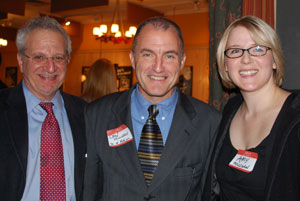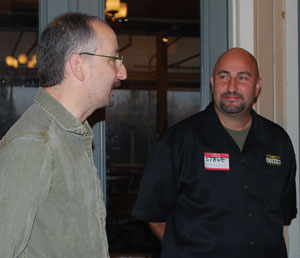Not Only CEOs Are Connecting

Some of the 40 or so people who attended Friday morning's CEO Connect event at Zingerman's Roadhouse.
Kim Cameron projected an image on the screen and asked people what they saw. “Mars,” someone guessed. Someone else thought it was an aerial satellite photo, presumably of planet Earth.
It was a cow, Cameron revealed, at which point the group murmured a collective “Aaah!”
The cow’s head was defined by the lighter shadings in the image. “When you look at the light,” Cameron said, “everything changes.” It’s not the image that changes, it’s your perspective on it.
The exercise was an effective illustration of Cameron’s message: Being positive can yield enormous results, both physiologically and in your business.
A co-founder of the Center for Positive Organizational Scholarship at the University of Michigan Ross School of Business, Cameron has researched this topic extensively. He stressed that his research is empirically based, unlike many leadership models that rely heavily on anecdotal case studies and inspirational stories of successful business leaders.
Cameron described how every living system is attracted to life-giving energy – we lean toward the light, metaphorically, just as plants lean toward the sun. It’s called the heliotropic effect, and can be a powerful force within organizations, he said.
His research looks at ways to use that effect to move organizations from a negative or normal state to being virtuous or extraordinary. Over the long term, these kinds of businesses are more productive, profitable, innovative and have higher customer retention, he said.
His most gripping example related to the cleanup of Rocky Flats, a former nuclear facility just outside of Denver. The situation was about as negative as you could get, Cameron said, in terms of toxic materials and the culture both within and outside of the 6,000-acre site. But because the company that was hired for the cleanup took such a positive approach, the job – originally estimated to take 70 years and cost $36 billion – got done in 10 years for around $7 billion. (A 2004 Fast Company article describes this transformation in detail.)
Many of the examples and research that Cameron presented are in his new book, “Positive Leadership: Strategies for Extraordinary Performance.” Several people at the event bought a copy to take with them – it’s sold locally at Nicola’s Books in the Westgate Shopping Center.
Cameron gave his talk Friday morning at a meeting of CEO Connect, organized by local business consultant Rob Pasick. As the event wound to a close, Pasick talked about the positive effect of supporting local businesses, and asked “What can we do locally to make a difference?” That might mean shopping at a locally owned store, eating at local restaurants, or using community banks that in turn invest in local ventures. All of these decisions will help the local economy, making it stronger regardless of external forces at play in the auto industry, Wall Street or elsewhere. He noted that his own new book, “Balanced Leadership in Unbalanced Times,” is being published by a local startup, David Crumm Media. “This is the spirit we want to encourage,” he said. “What little decisions do we make everyday?”

Rob Pasick, left, who organizes the CEO Connect events, with Dan Mulhern and Amy Milligan. Mulhern, who is married to Gov. Jennifer Granholm, is author of "Everyday Leadership" and hosts a weekly radio show by that same name on Michigan Talk Network. Milligan is development director at The Neutral Zone.





